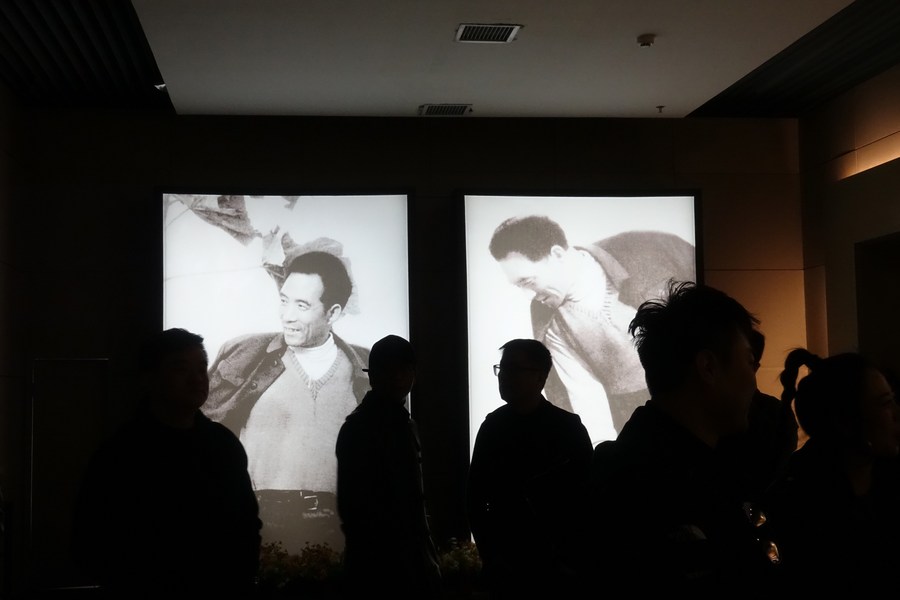
Crews of the film "My Father Jiao Yulu" visit the Jiao Yulu Memorial Hall in Lankao County, central China's Henan Province, March 22, 2019. (Xinhua/Xue Dongmei)
Under the silvery moonlight of a summer night in 1990, Xi Jinping, then a municipal official in Fujian Province, felt emotional. An article about a revered grassroots official occupied his mind.
"Who, among the common folks, does not appreciate a good public servant?" Xi then penned a heartfelt poem dedicated to the official. It was carried on a local newspaper the next day.
The official was a household name in China -- Jiao Yulu. Jiao was Party chief of Lankao County in central China's Henan Province in the early 1960s. At the time, the county was plagued by sandstorms and battled against saline-alkali land and floods. Its residents struggled to put food on the table.
The first thing Jiao did when landing on this posting was to head directly to the rural communities devastated by sandstorms to conduct research. "Faced with severe natural disasters, we should muster up our revolutionary courage and lead the people to fight a three-to-five-year tough battle to change the fate of Lankao," Jiao wrote in a note intended for his fellow Party cadres. "Unless that is done, we will never rest."
Jiao was a man of action, favoring on-site research and investigation over sitting in the office reading subordinates' reports. "It is tasteless to eat buns chewed by others," he once said.
Jiao worked tirelessly, disregarding self-interest to improve the lot of the people. Visiting the countryside, he often stayed in poor farmers' simple mud huts, eating and working with them. He turned down a plan to refurnish county government office. "Can't we work on broken chairs?" Jiao said. "People are still impoverished. We can't engage in any pomp. Not even think about it."
Jiao led by example, and the county's cadres followed suit. Their efforts eventually helped Lankao bid farewell to chronic food shortages. The forests they planted withstood sandstorms. Floods were curbed. Harvests were reaped from alkali soil.
But Jiao did not live to see this day. He succumbed to liver cancer in 1964.
Xi's respect for Jiao was cultivated at an early age. Back in 1966, as a middle school student, he read a feature story penned by three Xinhua reporters -- "Jiao Yulu: A Model County Party Secretary."
"I was deeply touched when I learned that Jiao kept on working even in the late stage of liver cancer, suffering from great pain," Xi recalled.
"It still affects me today," Xi once said after becoming the general secretary of the Communist Party of China Central Committee, elaborating that Jiao's spirit, which features people first and tireless and selfless work, was like a lighthouse that steered him from a rural grassroots official toward the country's top leadership.
Like Jiao, Xi is also known to be down-to-earth and interested in conducting on-site research and investigation to solve problems.
Xi vowed to eliminate absolute poverty in China after assuming the Party's top post in late 2012. In this endeavor, he conducted over 50 inspections and research studies on poverty alleviation, which included visits to all 14 regions with the highest concentration of extreme poverty.
This grand vision had been realized in just eight years, with nearly 100 million people lifted out of poverty across China. Today, in a country with 1.4 billion people, absolute poverty is a thing of the past.
This feat would not have been achieved without the work of numerous Jiao-style cadres.
In 2014, Xi visited Lankao. He went to Jiao's memorial and held a meeting to guide a Party-wide education campaign themed on adhering to the Party's mass line. At the meeting, Xi said: "Jiao built a lasting monument in local people's hearts, although he only worked in the county for over a year... A question to be pondered is what we can leave for future generations."
Five other education campaigns followed the mass line campaign over the past decade. All were designed to train better Party cadres.
For the education campaign launched earlier this year, Xi stressed that through the campaign, cadres must consolidate their ideals and convictions, gain wisdom, improve conduct, and be more motivated to work even harder.
All these qualities should be the pursuit of every Party cadre.
In the latter part of the poem Xi penned for Jiao, he wrote: "During the official's term in office, he brought benefits to the people, fulfilling his life-long aspiration."

